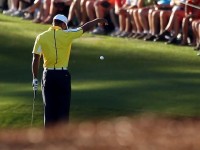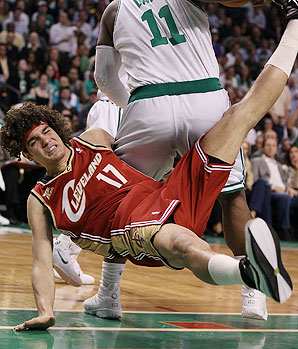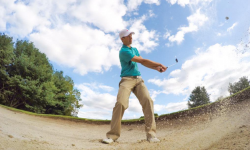The unprecedented media scrutiny surrounding Tiger's troublesome drop on the 15th at Augusta presents a worthy example of why golf differs from other sports as it pertains to cheating, flopping, and doing whatever it takes to get the W. People often refer to golf as a "gentleman's game" because unlike other sports where the referees determine what is fair our foul, in golf, the onus lies on the player herself to make it known that she broke a rule that warrants a penalty stroke. Tiger--in describing his thought process of the drop in a post round interview--"incriminated" himself by saying that he dropped the ball two yards behind the divot of his previous shot which bounced off the pin back into the water. The two club length drop is a ubiquitous standard in golf; however, in Tiger's circumstance--per The USGA's 26-1. Relief For Ball In Water Hazard: "Proceed under the stroke and distance provision of Rule 27-1 by playing a ball as nearly as possible at the spot from which the original ball was last played"--as nearly possible, unfortunately for Tiger, differs from "two yards" as he clearly stated after the round.
So if Tiger did in fact break a rule, he should have been disqualified, right? Not this time. Tiger didn't know the technicalities of rule, and lucky for him, according to the recently amendment Decision 33-7/4.5 which can "apply in limited circumstances not previously contemplated by the Rules of Golf where disqualifications have been caused by score card errors identified as the result of recent advances in video technologies." Despite the rule change, leading golf Analysts such as Golf Channels' Brandle Chamblee stated that Tiger's drop was "a flagrant, obvious violation. If Tiger has read the rule -- and I am sure he has by now -- it is incumbent upon him to say that he is in violation of [Rule] 26-1a and disqualify himself. Anything else, frankly, is unacceptable."
In my four years of NESCAC College Golf, I fortunately never witnessed an act of cheating - a testament to the quality of character that is a staple of the students that make up the Conference across all sports. Unlike golf, however, in other sports such as basketball and football, bending the rules to gain an advantage can be understood differently. Nonetheless, NBA commissioner David Stern had to impose penalties to mitigate rampant flopping (over emphasizing or faking contact in order to draw an offensive foul) throughout the Association.
Quite possibly the most notorious "fakers" are those soccer players who role around in seeming agony until a yellow or red card is drawn. In sports other than golf, frankly, I am less critical than most for those who fake to win. As a professional athlete, you put food on the table by winning; plain and simple. If a basketball player is going hard to hoop and yells when no contact is made (sorry Paul Pierce - and yes I'm a die hard Masshole Celtics fan), I don't blame him, that extra free throw could make the difference in the game. It happens in baseball too when a catcher "frames" the pitch, or moves his glove closer to the plate after he catches the ball in an attempt to deceive the umpire into thinking that the ball actually crossed the plate.
Golf, however, is different than all other sports with respect to cheating. Golf is the purest of games. Having caddied and played tournament college golf for over ten years, the game has taught me lessons of honesty and integrity that I might not have if I only stuck to basketball. The world around us is constantly changing in a myriad of ways every day; one thing I hope never does change is the code of conduct with which we carry throughout the rules, etiquette, and spirit of golf.





